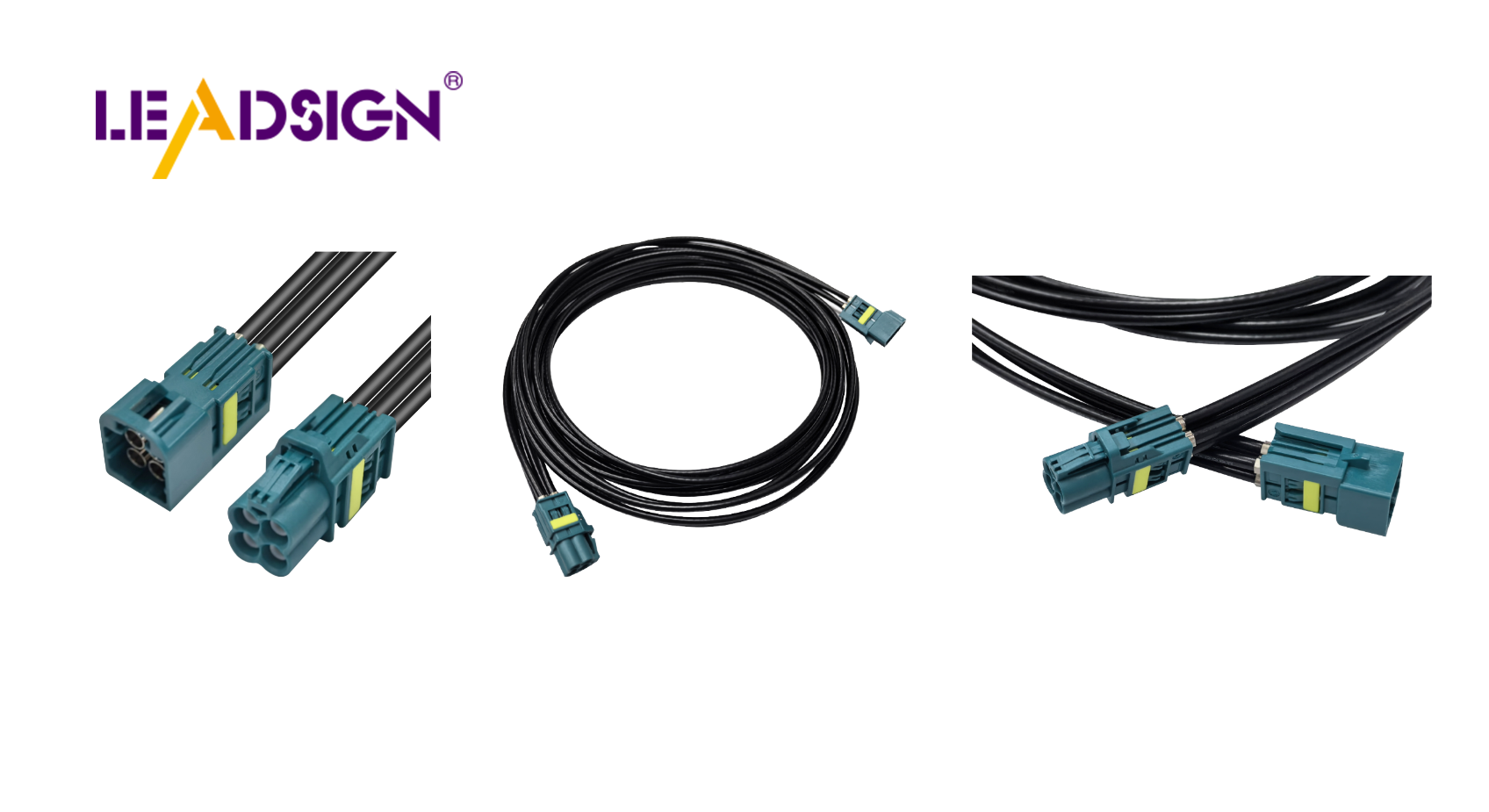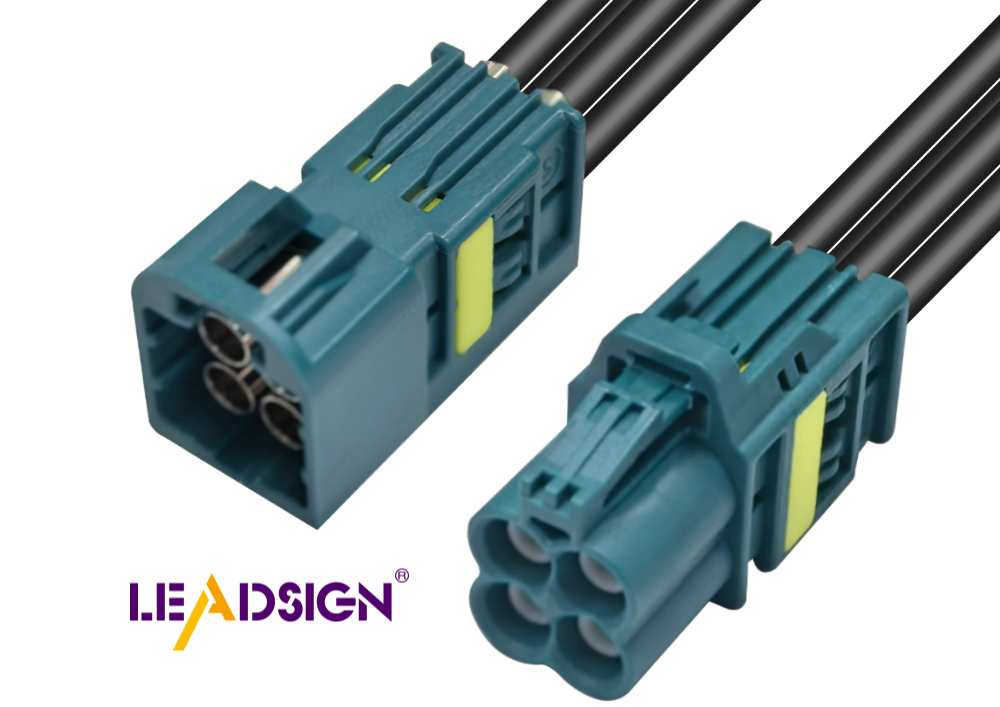What Are the Different Types of Automotive Wire Connectors

Car wire connectors are important for your car's electrical system. They keep connections steady and stop problems that may cause failures. To pick the right connector, you need to know the various automotive wire connectors types. This helps you choose one that fits its job well, making your car work better and more reliably. These parts are essential for sending power or data in modern cars.
Key Takeaways
Understanding the different types of automotive wire connectors is essential for maintaining your car's electrical system effectively.
Choose the right connector based on its function: power connectors for energy flow, signal connectors for data transmission, and grounding connectors for safety.
Consider the environment where the connector will be used; options like weatherproof connectors are crucial for outdoor applications.
Select connectors made from appropriate materials, such as metal for strength or plastic for lightweight needs, to ensure durability and performance.
Pay attention to the size and fit of connectors to prevent issues like overheating or loose connections, which can lead to system failures.
Utilize plug-and-play connectors for easy installation, saving time and reducing the risk of mistakes during setup.
Decide between crimp and solder connectors based on your project needs; crimping is faster, while soldering offers a more permanent solution.
Types of Automotive Wire Connectors
Knowing about car wire connectors helps you choose wisely. These connectors are grouped by their job, location, and design. Each type has a role to keep connections working well.
By What They Do
Power Connectors
Power connectors move electricity to important car parts. They send power to the battery, alternator, and starter motor. These connectors keep energy flowing so your car works smoothly.
Signal Connectors
Signal connectors send information between car systems. They help with things like navigation, sensors, and entertainment. Accurate data flow is key for modern cars with smart features.
Grounding Connectors
Grounding connectors let electric currents safely return to the ground. They stop damage from short circuits or power surges. Good grounding protects your car’s electronics.
By Where They're Found
Engine Bay Connectors
Engine bay connectors handle heat and tough conditions. They work in places like the engine control unit (ECU) and fuel injectors. These strong connectors perform well in hard-to-reach areas.
Interior Connectors
Interior connectors are inside the car cabin. They link air conditioning, dashboard controls, and entertainment systems. Their small size makes them easy to fit into tight spaces.
Exterior/Weatherproof Connectors
Exterior connectors resist water, dust, and bad weather. They're used for lights, parking sensors, and backup cameras. Their tough design works well outdoors.
By How They're Built
Male and Female Connectors
Male and female connectors are common types of wire links. The male part has pins that fit into the female sockets securely. This setup is reliable for many uses in cars.
Splice Connectors
Splice connectors join wires without extra parts needed. They're great for fixing or adding wires quickly in vehicles. These provide strong connections easily.
Terminal Blocks
Terminal blocks connect several wires at one spot neatly. They're useful for organizing complex wiring setups in cars. Terminal blocks make managing wires simple.
By Size and Capacity
Miniature Connectors
Miniature connectors are tiny but very useful parts. They fit in small spaces where big connectors can't go. These are perfect for modern cars with advanced features needing precise wiring. They often link sensors, cameras, and other small gadgets. Their light design lowers the car's weight, improving fuel use and performance.
Heavy-Duty Connectors
Heavy-duty connectors handle strong electric currents and tough conditions. They are used in engines, transmissions, and special vehicle machinery. These connectors last long because they resist damage over time. Their strong build makes them great for jobs needing strength and dependability. They keep important systems working well under pressure.
Multi-Pin Connectors
Multi-pin connectors join many wires into one unit. They're great for complex systems like navigation or driver-assist features. These save space by combining several connections together neatly. Their design keeps connections secure and reduces mistakes or problems. You can trust them to work well in complicated car systems.
Common Uses of Automotive Wire Connectors

Car wire connectors are key for smooth electrical system operation. They are made to fit different systems like power, data, and safety.
Electrical Systems
Battery and Alternator Connections
Battery and alternator wires need strong connectors for steady electricity. These connectors help the car start easily and run well. They handle high power and stop energy loss, keeping the car working properly.
Lighting Systems
Lighting wires use secure connectors for headlights, taillights, and inside lights. These keep the lights working safely in bad weather or at night. Reliable lighting is important for seeing clearly while driving.
Communication Systems
Audio and Infotainment Wiring
Audio systems use special connectors to link speakers and screens. These provide clear sound and pictures for a better drive. They also support touchscreens and voice commands for easier control.
Sensor and Data Transmission
Sensors need accurate connectors to send information between parts. These help with navigation, parking, and engine checks. Good connections make these features work smoothly in your car.
Safety Systems
Airbag and ABS Wiring
Airbags and ABS rely on good connectors to work during emergencies. Strong connections ensure airbags open right when needed. They also help brakes stop accidents by working correctly.
Backup Cameras and Parking Sensors
Backup cameras use waterproof connectors to work outside the car. These stay stable even in rain or dirt, helping you park safely. They prevent crashes by showing obstacles clearly.
How to Pick the Best Car Wire Connector
Picking the right wire connector helps your car work well. Think about things like material, sealing, size, and fit. These details make sure it lasts long and works safely.
Material and Strength
Metal or Plastic Connectors
Metal connectors are strong and carry power well. They handle big currents and last a long time. Use them for engines or high-power systems. Plastic connectors are light and don’t rust easily. They’re great for places where less weight is needed, like inside the car. Pick based on what your system needs most.
Rust Protection
Rust can ruin connections and cause problems. Choose connectors with coatings or stainless steel to stop rusting. These stay strong in tough conditions like outside or near the engine. Rust-proof connectors last longer and keep working well.
Sealing Against Water and Heat
Waterproof Connectors
Waterproof connectors stop water from causing damage. They’re perfect for outdoor parts like lights or cameras. These prevent short circuits when it’s wet outside. Look at IP ratings to know how much water they block.
Heat-Proof Connectors
Heat-proof connectors handle high heat without breaking down. They’re important for wires near hot engines. Materials like silicone or special plastics keep them working in extreme heat.
Fit and Size
Matching Wire Sizes
The connector must fit the wire size properly. If sizes don’t match, wires may come loose or overheat. Always check that the connector fits your system’s wire size perfectly.
Connector Size and Pins
Connector size decides how many wires it can hold together. Multi-pin ones are good for complex systems like screens or navigation tools. Smaller ones fit tight spaces inside cars easily. Pick a size that works best without losing performance.
By thinking about these points, you’ll find the right connector for your car's needs! This keeps your car safe and its electrical parts running smoothly.
Easy to Install
Plug-and-Play Connectors
Plug-and-play connectors make installation simple and quick. You don’t need special tools or skills to use them. They come ready to connect, so wires attach easily and securely. These are great for things like speakers or lights needing fast setup. Their design lowers mistakes, giving a strong connection every time.
These connectors also save time during fixes or upgrades. You can unplug and reconnect them without trouble. This makes them useful when parts need replacing often. Using these connectors keeps your car’s electrical system working well without any hassle.
Crimp vs. Solder Connectors
Crimp and solder connectors join wires in different ways. Crimp connectors hold wires tightly with pressure inside a metal sleeve. A crimping tool is all you need for a strong connection. They are quick to install and resist shaking, making them reliable for cars.
Solder connectors use heat to melt solder, joining wires permanently. This method gives a very solid and conductive link between wires. It’s best for systems needing accuracy, like sensors or data lines, but takes more time and skill.
When picking one, think about your needs first. Crimping is faster and works well for most uses. Soldering is better for jobs needing extra precision and strength. Both methods work well if done properly.
Car wire connectors are important for your car's electrical systems. Each type has a special job to handle different needs. To pick the right one, think about material, size, and fit. Choosing wisely keeps connections safe and helps your car work better. Knowing about these connectors helps you take care of your car. This makes sure it runs well and lasts a long time.
See Also
Why Fakra Connectors Matter in Today's Vehicles
Understanding HSD Connectors Within Automotive Applications
Fakra Connectors: Essential Components in Automotive Design
Discovering How Fakra Connectors Enhance Vehicle Performance

